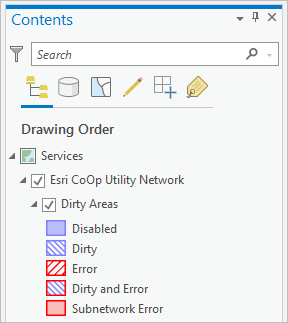Available with Standard or Advanced license.
Depending on your level of access and the desired task, there are several ways to access the utility network dataset so that it can be added to an active map.
In the Catalog pane  , you can access the utility network and related network classes using different tabs:
, you can access the utility network and related network classes using different tabs:
- The Portal tab—Displays the utility network and related classes when working with a utility network published from an enterprise geodatabase. Access to the utility network through the Portal tab is intended for tasks such as adding to an active map view to work with the utility network layer for editing or analytic operations.
- The Project tab—Displays the utility network and related classes when working in a single-user or enterprise deployment. When working within an enterprise geodatabase, the utility network is visible under Databases using a database connection
 established as the database user who owns the dataset. Access to the utility network through the Project tab with an enterprise geodatabase is intended for administration tasks and configuration of the utility network. The utility network is visible under the associated file or mobile geodatabase in a single-user deployment.
established as the database user who owns the dataset. Access to the utility network through the Project tab with an enterprise geodatabase is intended for administration tasks and configuration of the utility network. The utility network is visible under the associated file or mobile geodatabase in a single-user deployment.
You can access the utility network layer through the Contents pane when the utility network is added to an active map view  . In the Contents pane, the utility network layer is prefixed with the utility network name and Utility Network, for example, EsriCoOp Utility Network.
. In the Contents pane, the utility network layer is prefixed with the utility network name and Utility Network, for example, EsriCoOp Utility Network.
Access the utility network tab
To access the Utility Network tab, the utility network layer must be in an active map view. To take advantage of subtype layers, the datasets that are configured with subtypes can be added to the map using subtype group layers.
When working with an enterprise geodatabase, the utility network and related feature classes must be shared to the ArcGIS Enterprise portal through a feature service.
- On the Insert tab, in the Project group, click New Map
 .
. - On the Map tab, in the Layer group, click Add Data
 and click Subtype Group Layer
and click Subtype Group Layer  . Browse to the data source of the utility network and use the Ctrl key to select all the related utility network feature classes, except for the utility network dataset. Click OK.
. Browse to the data source of the utility network and use the Ctrl key to select all the related utility network feature classes, except for the utility network dataset. Click OK.- For a utility network shared using services, the data source is under Portal
 .
. - For a utility network in a single-user deployment, the data source is under Project or Computer.
- For a utility network shared using services, the data source is under Portal
- On the Map tab, in the Layer group, click Add Data
 . Browse to the utility network dataset
. Browse to the utility network dataset  and click OK.
and click OK.The Utility Network tab appears.
- Click the Utility Network tab to activate.

Access dirty areas
Dirty areas indicate a modification to the network has taken place, but it has not been validated in the network topology. To access dirty areas, add the utility network layer to an active map view.
- Ensure the utility network and related layers are added to an active map view.
- In the Contents pane, expand the utility network layer.
You can now view and explore the Dirty Areas sublayer.

Access utility network properties
The Layer Properties dialog box provides a centralized location to view information about the current state and configuration of the utility network. As you work with and configure your utility network, any changes you make are reflected here.
The following steps summarize using the Contents pane when the utility network dataset is added to an active map view.
Tip:
You can also access the utility network properties through the properties context menu of a utility network dataset from within the geodatabase or database connection in the Catalog pane.To access the Layer Properties dialog box for the utility network, complete the following steps:
- Ensure the utility network and related layers are added to an active map view.
- In the Contents pane, right-click the utility network layer and click Properties to open the Layer Properties dialog box.
There are several standard tabs listed. The General, Metadata, and Source tabs contain general information about the layer.
- Click the Network Properties tab for more detailed information about the utility network.